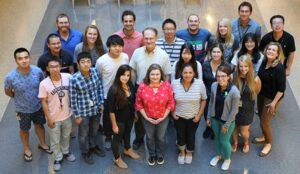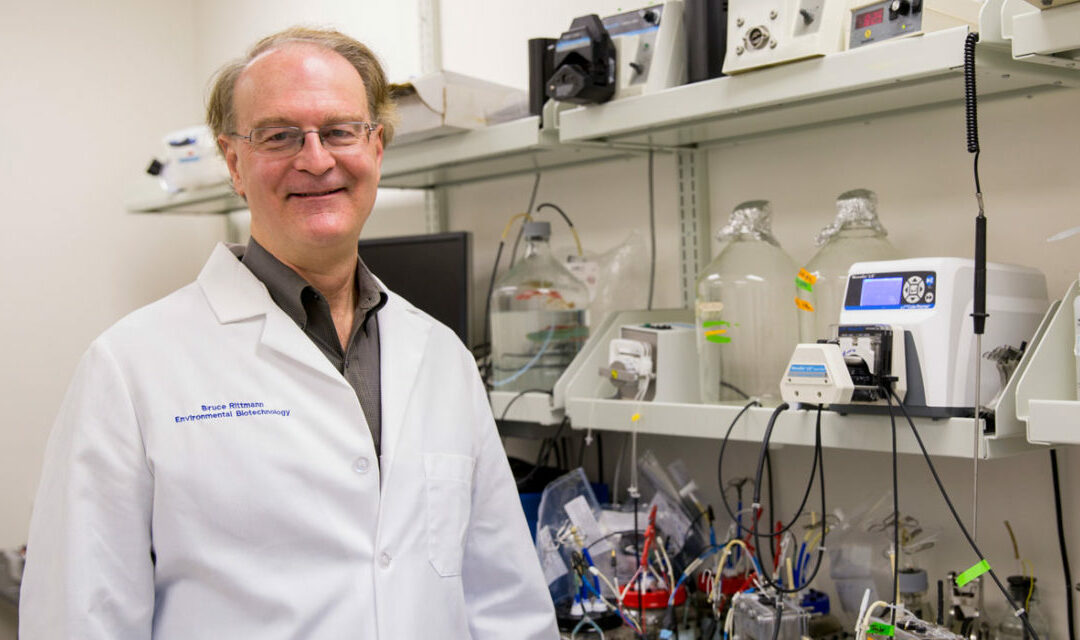“The concept of wastes or waste products is obsolete –
the focus and the future are used resource recovery.”
Dr. Bruce Rittmann
Dr. Bruce Rittmann, Ph.D., is the director of the Swette Center for Environmental Biotechnology at the Biodesign Institute at Arizona State University and is also a Regents’ Professor in the School of Sustainable Engineering and Built Environment. He joined ASU in January 2005.
An international leader in managing microbial communities, Dr. Rittmann’s work is leading to new ways to clean up pollution, treat water and wastewater, capture renewable energy, and improve human health.

The Swette Center is famous for its culture of cross-disciplinary and team-base research. This culture begins with our diverse set of researchers who come from many disciplines within engineering, life sciences, chemistry, and more. For example, graduate students join the Center from eight Ph.D. programs on the ASU campus: three in engineering (environmental, chemical, and biomedical), three science disciplines (microbiology, environmental life sciences, and chemistry/biochemistry), and two inherently inter-disciplinary programs (sustainability and biological design). The Center organizes it research through collaborative teams. Some teams are applications based, such as microbial electrochemical cells, photobioenergy, and bioremediation. Other teams are more methods based, such as mathematical modeling and molecular microbial ecology. Please learn more from the links to our research groups. What is very important about our teams is that they interact extensively. Researchers often are on more than one team, and several teams usually work together to form a hyper-team for a research project.
The membrane biofilm reactor (MBfR), a technology that Dr. Rittmann invented, uses naturally occurring microorganisms to remove contaminants such as perchlorate and tricloroethene from water. He holds five patents on the technology, which is being commercialized by APTwater, Inc.
Dr. Rittmann is at the lead of ASU teams using two innovative approaches to renewable bioenergy: using anaerobic microbes to convert biomass to useful energy forms, such as methane, hydrogen, or electricity; and using photosynthetic bacteria that can capture sunlight to produce new biomass that can be turned into liquid fuels, like diesel or jet fuel.
The links between microbes and human health also are being explored through collaboration with the Mayo Clinic. Dr. Rittmann’s group explores how microorganisms in the human intestine contribute to obesity, which may lead to means to regulate the microbial communities in ways that mitigate excessive weight gain.
According to Institute for Scientific Information, Dr. Rittmann is one of the world’s most highly cited researchers. He has published nearly 500 peer-reviewed papers. His textbook, Environmental Biotechnology: Principles and Applications, is used by universities around the world to educate students about the ways in which microorganisms can be used to improve environmental quality.
Prior to his time at ASU, Dr. Rittmann was a John Evans Professor of Environmental Engineering at Northwestern University and a professor in the Department of Civil Engineering at the University of Illinois at Urbana-Champaign. He began his career as an environmental engineer at Sverdrup and Parcell and Associates.
Dr. Rittmann has received many accolades during his career. These include being named an International Water Association Fellow, American Association for the Advancement of Science Fellow, ASU Regents’ Professor, and National Academy of Engineering member. He has also won the Arizona BioIndustry Association 2009 Award for Research Excellence, American Society of Civil Engineers 2009 Simon W. Freese Award, 1994 National Water Research Institute’s Clarke Prize for Outstanding Achievement in Water Science and Technology, and the Huber Research Prize from American Society of Civil Engineers.
Dr. Rittmann studied environmental engineering at Stanford University, where he earned a doctoral degree, and at Washington University in St. Louis, where he completed a master’s degree. He also earned bachelor’s degree at Washington University in civil engineering.

